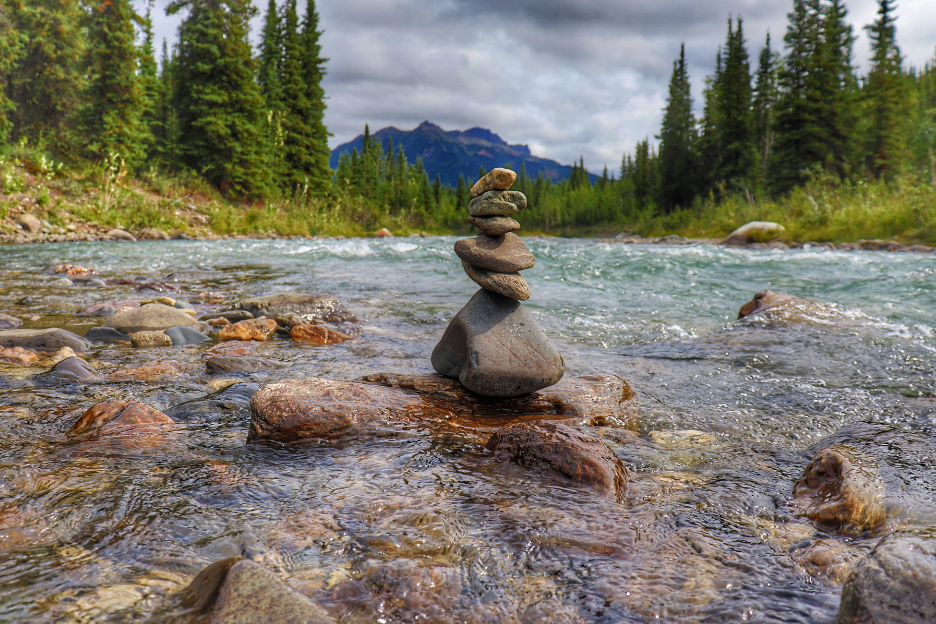
I have been thinking a lot about wilderness lately. I sit writing this piece immediately following the festival of Shavuot, when we Jews celebrate God’s giving of the Torah and our entering into covenantal relationship with God in the wilderness of Sinai. In addition, Jewish communities around the world are currently reading from the book of Numbers in the Torah. With its narratives of the Israelites’ wilderness wanderings, the name of this fourth book of the Torah in Hebrew is Sefer B’Midbar. B’Midbar means “in a wilderness.”
Nearly thirty years ago, during my first year of rabbinical school in Jerusalem, I backpacked for a week in the Santa Catarina mountains of the Sinai desert. Our small group explored Jewish spirituality and the desert, silence as a spiritual practice, and the transformative possibilities of becoming like the wilderness — open, quiet, unencumbered. I was deeply moved by the experience. Even now, I can sense the wind’s whistle and whispers, the sounds of human voices traveling great distances to interrupt the silence, the awareness of our vulnerability, and the presence of life in hidden places waiting to amaze us when we slow down enough to look.
For centuries, people have entered the wilderness to transform themselves, to become different people. Wilderness is uncharted, difficult terrain. In the wilderness, we often cannot see the next step forward, and sometimes it seems that there is no way to make our passage through. We must wait to see the opening. Our movement is slow and gradual. Change results from slight shifts and is noticeable only over extended periods of time.
Wilderness is a powerful space. It is an awareness that personal growth and healing come from our journeys into and out from places of discomfort. In the wilderness, our unhealed grief and trauma wounds — individual, ancestral, and collective — announce themselves and demand our attention. The pain can be enormous. But healing waters emerge from rocks and other unlikely places. We learn to soften and love ourselves with great compassion. God speaks to us in this wilderness of vulnerability, which awakens transformation.
Participation in Shalem Institute’s Nurturing the Call: Spiritual Guidance Program is a wilderness experience too. Deep listening, the practice of discernment, tending to the soul’s sweet song, surrendering to God’s guiding presence as we accompany another human being on their spiritual journey bring us into the unknown. I was drawn to Shalem Institute’s program because of its rigor and because of its rooting in the Christian contemplative tradition. I believe in the importance of interfaith engagement, and I wanted to learn of and from a tradition in addition to my own.
The gifts of participation in Shalem’s Spiritual Guidance Program have been numerous. The opportunity to offer spiritual guidance with peer group support and reflection is a blessing. The first residency was nurturing, loving, and flowing with affirmation. A number of the readings, especially Douglas Christie’s The Blue Sapphire of the Mind: Notes for a Contemplative Ecology, and the opportunity to integrate my learning and experience through the writing of theme papers have deepened my work and life enormously. During this time of participation in the program, I have deepened my spiritual practice and rooting in synagogue community. This has been a blessing and a tikkun/repair.
There are also some significant challenges to participation in Shalem Institute’s Nurturing the Call. It is especially difficult to be the only Jew in an interfaith setting right now. The rise of violent antisemitism in this country is alarming and has prompted a collective felt sense of fear and vulnerability. With recent murders and attacks, we Jews are on edge and understandably so.
Some of the components of the Spiritual Guidance Program’s curriculum and readings, scheduling and staffing have triggered me and feel hurtful to me. In my experience and opinion, a trauma-informed lens as well as respect for boundaries and appreciation of our differences are best practices and, to maintain safety, essential for every aspect of this program’s delivery. At times, I have not felt that and hope that Shalem Institute will take this challenge seriously.
I also hope and pray that we can stay engaged and in conversation, even when we are hurting and words evade us. Interfaith work is not easy. And right now, the need for it feels especially important. Like generations of people who came before us, we are called into the wilderness to heal our hurt places and become different people, individually and as a collective. What a precious invitation. I trust that God will speak to us in the wilderness. Let’s go there now together.
